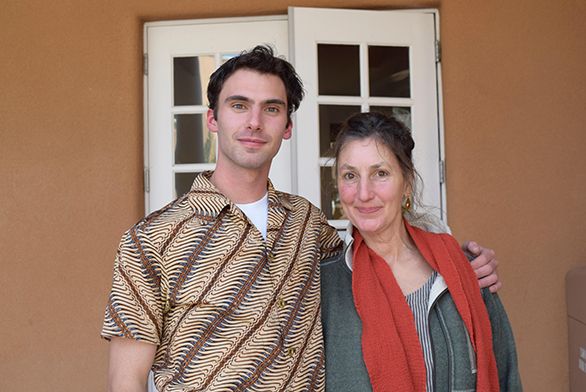Santa Fe Senior Essay Prize Winner Talks Huckleberry Finn
June 4, 2019 | By Rebecca Waldron

Silas Blunk (SF19) won the coveted senior essay prize at Santa Fe's Commencement for his work, titled “Fiction: Form and Content in Mark Twain’s Adventures of Huckleberry Finn.”
What was the crux of your essay?
My topic ended up being really broad. Basically, I was interested in stories: fictional stories, but also stories in general. Our lives are full of stories. What makes them meaningful? What makes them empty? And how do we tell the difference? How do I relate to this narrator who’s talking to me and trying to tell me a story? The opening lines are kind of odd. The first word is you. “You don’t know about me without you have read a book by the name of The Adventures of Tom Sawyer.”
It’s odd in that it’s a direct address?
Yes. I found it interesting that Huck begins by speaking to you as if you were face-to-face. But he’s also telling you that you don’t know about him except through reading a book—through a story, in other words. How strange! How can I reconcile his direct and familiar address with the fact that I only know about him through some kind of make-believe story?
And not his own story it seems. If you know about him, it’s from Tom’s adventure story.
It’s interesting because Tom’s the most literate character. He’s always citing books like Don Quixote. A lot of the books he references are adventure stories—European adventure stories, mostly. But it seems like Tom reads books without really understanding their meaning. He doesn’t understand what it means to be something like a robber, or a murderer, or to be imprisoned. It’s only the fun, adventure part that he’s interested in, without the seriousness. He seems to interpret books for his own ends. He takes pieces of them—the outward flashiness of an adventure (which he calls “style”), or the high-sounding authority of some author’s hard-to-pronounce name—and then fails to see the rest of the book. Or he takes some little piece (like the idea of “ransoming”) and makes it mean whatever he wants.
He’s read the most books, but he’s blind to the life around him. He keeps calling Huck ignorant, and Huck calls himself ignorant, even while doing courageous, insightful, honorable things like deliberately saving Jim. I was pretty hard on Tom; I saw him as kind of one-dimensional. But I was interested in that, kind of comparing Tom and Huck.
Were there other kinds of stories you were interested in as well?
The narrative of slavery is also kind of like a story. I was thinking about it as a kind of fiction, something that requires a set of beliefs—a societal story. And I was trying to understand how the different characters relate to that story. Huck has grown up with this narrative of slavery. How is it that he’s able to see through that narrative? For everyone else, their sense of morality seems determined, more or less, by what looks to us like something deeply inhumane. What if I were Huck and I grew up in a culture where I was taught to believe these sorts of things about a certain group of people? I guess one of the things I noticed that disturbed me was how much our sense of morality is subject to stories.
Why were you interested in Adventures of Huckleberry Finn in particular?
I knew I wanted to write on fiction. I had thought about Huck Finn before, when we read it for seminar. There are a few different scenes that really just captivated me. I didn’t exactly know what my paper was going to be about at the beginning of December, but I knew the question was going to be about the role fiction and stories play in our lives, and the way we derive meaning from them.
I always thought of Huckleberry Finn as sort of a kids book in a way. It can feel not serious in a way that Shakespeare is serious. But I realized that I wanted to think more about ordinary language, colloquial speech. I was interested in language or style that most people view as just ordinary, but that might have deeper meaning. When you read Shakespeare, you think these words are extremely elegant writing. When you read Huck Finn, it feels like just some country boy talking. Something about the humbleness of that appeals to me.
I also love the simple scenes on the river. I grew up on Tomales Bay, which is a long, narrow bay north of San Francisco. It reminds me a lot of a river in some ways. So that was in my mind a little bit. I don’t think I made a decision because of that, but it definitely drew me toward the book.
Something of your personal narrative connecting you to the book?
Yeah. At the beginning, even though I didn’t know what I was going to write on, I felt like the book was promising. I think I just kind of trusted my gut. I ended up asking a lot of questions. I didn’t answer most of them, but I think maybe people ended up appreciating that spirit of inquiry. That’s what I liked about the paper anyway. Living in that mode of open questioning. It felt very in-line with what I think of as the spirit of St. Johns—just letting yourself be open to a book.

